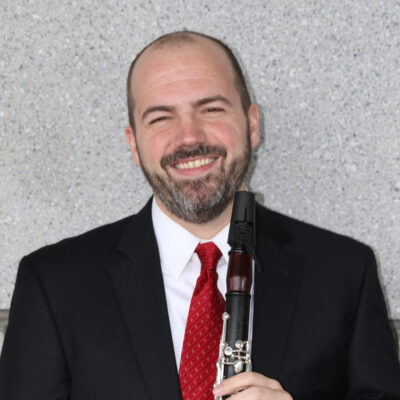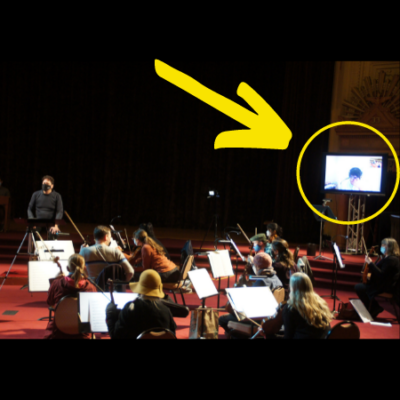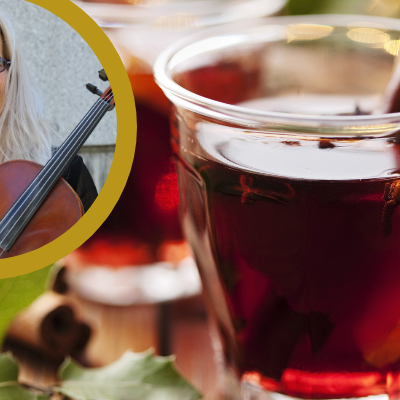Silicon Valley tech whizz by day and California Symphony’s Juilliard-trained virtuoso on weekends, clarinetist Stephen Zielinski answers our burning questions about his life and music career—including how he and Maestro Donato Cabrera share a connection that dates back almost two decades.
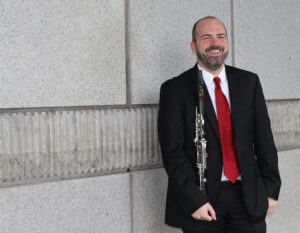
Stephen Zielinski, Photo: Art Garcia
1. Can you tell us a little about your life in music?
I’ve always loved music and I enjoyed learning different instruments from a young age. At 10 years old, I picked up the clarinet but I didn’t stop there. By the time I got to High School, I was regularly performing on clarinet, trumpet, alto and soprano sax, piano, and even the flute, but the clarinet’s flexibility and versatility always made it my favorite instrument.
My undergrad years were spent studying clarinet performance at Manhattan School of Music in the early 2000s. That’s where I first met Maestro Cabrera and played under his baton. For my masters degree, I decided to stay in NYC and got accepted into Juilliard’s Master of Music program. While at Juilliard I spent two summers at the Spoleto festival in Italy, as well as taking part in Juilliard’s Centennial Tour, performing in Lucerne, Berlin, Helsinki and at the BBC proms in London. After I finished my schooling in NYC, I landed some really great gigs, including a tour to Jakarta, Indonesia, with the Continuum Ensemble, and I’m on several recordings of Stravinsky and Webern works for the Naxos label.
2. What are three things that you’d like people to know about your instrument that they might find surprising?
First, I have four instruments that I own and regularly use: two soprano clarinets, a piccolo clarinet, and a bass clarinet. My parts in an orchestra can be for clarinets in many different keys, which means I often have to sight-transpose the notes on the page.
Second, many people are not aware that the clarinet is a relatively new instrument, so you won’t find any works for clarinet before the Classical period, which started around 1730—which is a shame because I adore Bach.
Finally, my instruments are a hybrid of two makers and have two separate types of wood, Grenadilla and Cocobolo. Both of these types of wood are becoming increasingly difficult to obtain due to climate change, so the instruments of the future may be very different than the instruments of today.
3. In addition to being an extremely talented clarinetist, you have a “real job” in the tech world. Can you tell us more?
While the gigging scene in NYC was very exciting, it’s not the most financially stable situation. Throughout schooling, I always managed to find part time work in the tech field, slowly gathering experience over the years. By the time I finished my conservatory studies, I was able to land a job as an IT consultant.
By 2011, I was looking to advance my career. Friends in the Bay Area said they thought I could land a job in tech locally, but having no formal STEM [Science, Technology, Engineering and Math] education, I wasn’t sure it would work out. With minimal savings, no job, and only the promise of a couch to sleep on, I sold or donated most of my belongings, got a car loan and a car, packed up what I could fit into it, and drove across the country to California.
It took about three months of living on credit cards before I found a job with an online gaming startup in Silicon Valley. I then moved on to LinkedIn, which was quite a different scale of business to work in. After that, I joined a machine learning startup called Trooly, which was acquired by online homestay and tourism giant Airbnb. That’s where I work today.
4. You won your audition with the California Symphony two years ago. Do you remember much about the experience? Were you confident you’d got the job?
I’ve taken quite a lot of auditions in my life but I’ve never done all that well on ones that include Eb clarinet, which was what the California Symphony audition was for. The Eb clarinet, also known as piccolo clarinet, is notoriously difficult to tune and control for any player, and can even cause hearing damage if practiced without ear protection!
I was pleasantly surprised to hear I advanced through each round, especially considering the very high level of playing among the other players. After doing so many auditions, I’ve learned to anticipate the worst and hope for the best.
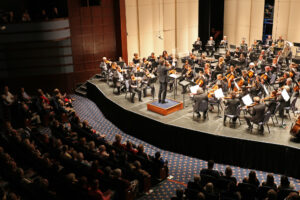
Zielinski performs with the California Symphony. Photo: Art Garcia
Stephen and I have known each other for close to twenty years and were in school together in New York City at the Manhattan School of Music in the early 2000s.
I remember thinking then, as did so many, that Stephen was headed to great things. It is a wonderfully large circle that has closed that Stephen now performs with the California Symphony and we are so fortunate to be able to hear his incredible musicianship and gorgeous sounds from his clarinet at our concerts.” — Donato Cabrera
5. What’s the craziest thing that’s ever happened to you in performance?
A few events stand out in my mind:
- An intermission power outage at our last California Symphony concert! This actually wasn’t the first time I experienced a power outage during an orchestra performance. One time was in a church for a smaller orchestra for a matinee. It was hard to see the music but—unlike at the Lesher—there was a small amount of ambient light in the church providing just barely enough light to see the page and conductor, so the show continued in the dark.
- A show involving fireworks where some of the pyrotechnics did not launch correctly, spraying fiery sparks on the orchestra.
- A show where a snow effect malfunctioned, sending tons of fake snow in the form of tiny soap bubbles onto the musicians in the pit.
- A pocket watch prop on stage of an opera breaking and flying into the pit.
Hear Stephen Zielinski in California Symphony’s EPIC FINALE, taking place Saturday, May 14 at 7:30 PM and Sunday, May 15 at 4 PM at the Lesher Center for the Arts. Tickets are $44 to $74. Buy tickets online or call or visit the Lesher Center Ticket Office at 925.943.7469, Wed – Sun, 12:00 noon to 6:00 pm.


